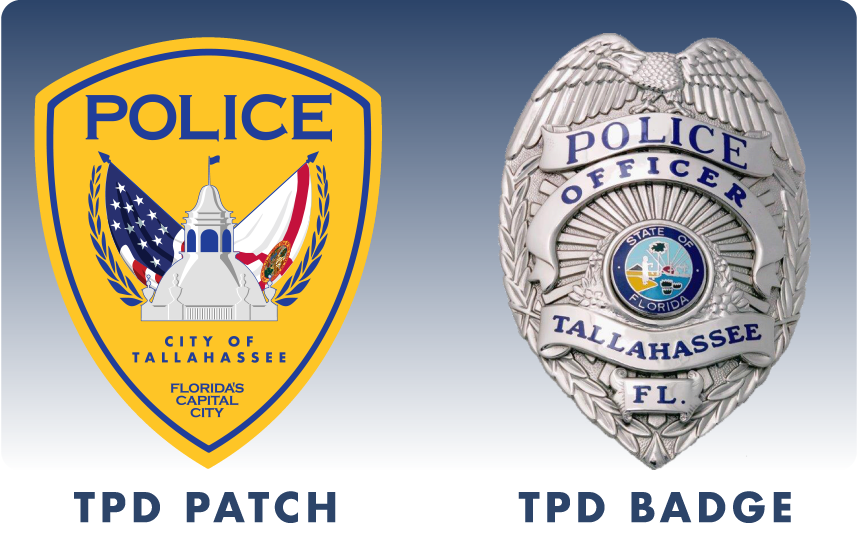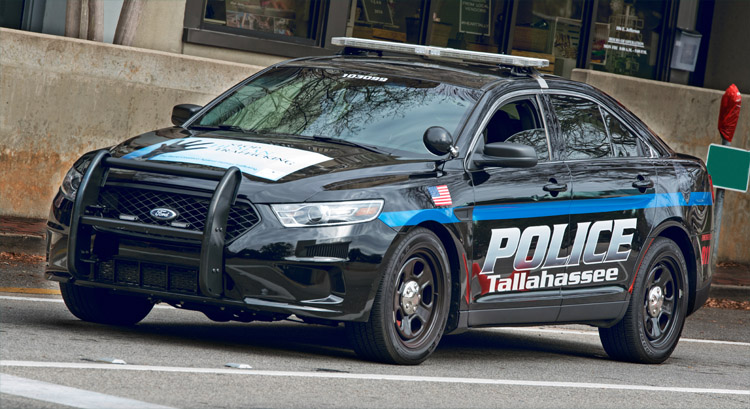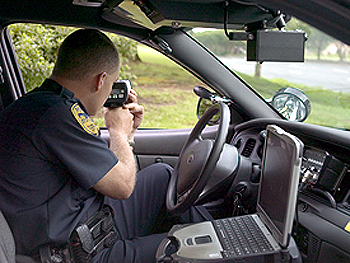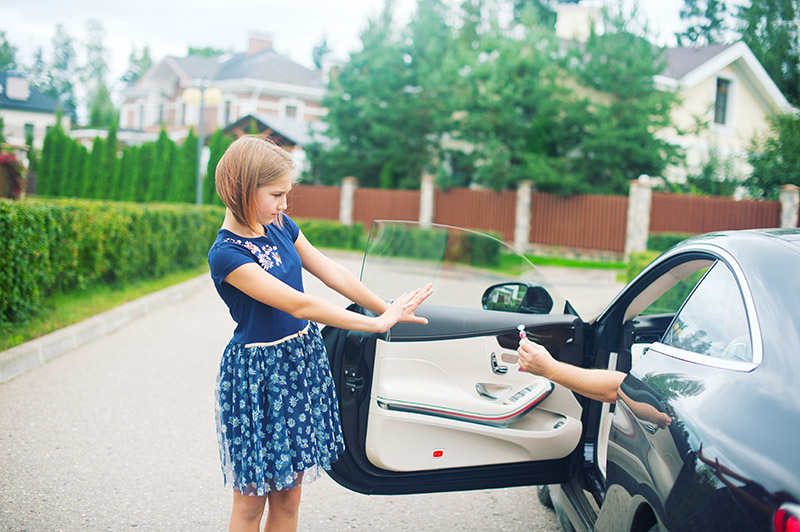TPD | Just for Kids

Hello, and welcome! You may have had a visit from a police officer at home or school, or you may have seen a police officer working. The information below will show you why and how we do things. We also want to share with you things you can do to stay safe.
Police Uniforms
Police officers live in homes like yours and some of us even have children your age. Just like your mom or dad, when we wake up, we get ready for work by putting on work clothes. Our work clothing is a police uniform. Our uniform has a patch on the shoulders to show where we work. We also wear a police badge to show we are the police.
 Tallahassee Police Department
Tallahassee Police Department
Uniform Patch and Badge - On our patch (see image at right), the picture is of the State Capitol dome and the flags of the United States and Florida.
Our badge (see image at far right) has an eagle showing our allegiance to the United States of America. The eagle's wings are spread to show we are covered by the laws and freedoms that the American eagle represents. The outside edge of the badge is covered by olive branches, which symbolize peace. The center has the State of Florida Seal. It is required to be displayed on our badge by a special law and shows we are governed by the laws of the State of Florida.
The Tallahassee Police Department started way back in 1826. It is one of the oldest Police forces in America. That was over 190 years ago.
Our uniform also has a very long history. Navy was chosen as the color because a long time ago lots of police were needed very quickly and there wasn't a lot of time to make new uniforms. Many soldiers had just gotten out of military service, including the Navy. So they used their military uniforms that were made of navy colored boiled wool. Their jackets had big pockets that helped them hold their police tools. These jackets also had bright shiny buttons and badges made of copper. That is why police were called "coppers," which today is shortened to "cops."

How Police Get Around Town
Police officers need to be able to go anywhere in town and face any situation. To help us get where we need to go and have everything we need to do their job, Police use cars, buses, trucks, bicycles, motorcycles and more. We have special vehicles that help us respond to dangerous situations and emergencies. We even have a vehicle that looks like a tank that can drive off of the road and keep us very safe.
To help us get to where we are needed, police departments have Public Safety Communications Operators, that we call "dispatchers.". Dispatchers take phone calls and give police officers directions and who to meet by radio and by computer. They have to know a lot about computers. We also have to know a lot about helping people on the telephone.
 Tools and Technology
Tools and Technology
Police use lots of tools, including computers. Some police officers use computers inside the Police Station. Some police officers use computers in their cars. We also use radios, and lots of tools we carry on our belts. One of the tools we carry on our belt is a gun. Our guns are tools we use to protect us and other people. Police also have clothes and gear that keep us safe, including helmets, bullet proof vests, special masks and camouflage clothing.
We have special lights and sirens on our cars and trucks to let people know when we have an emergency, or when we want them to stop and talk to us. Even our motorcycles have lights and sirens. People should always pull over to make way when our lights are flashing and our siren is making noise. The people we pull over are strangers to us, so we have to be very careful.
We hope you are careful around strangers, too. A stranger is someone you don't know or who you don't know well. Even someone you may see every day is a stranger because you don't know them well. Never accept gifts from strangers and never go anywhere with a stranger. Talk to your mom or dad on what you should do in different situations to stay safe.
What You Need to Know About 9-1-1
An emergency is when someone's life is in danger. You and your parents should make a plan so that everyone in your family knows what to do when emergencies happen. The more you practice, the more you will be ready if you find yourself in an emergency.
- People can call 9-1-1 for emergencies. You can also use 9-1-1 if you are lost. Here are some tips on how to use 9-1-1:
- 9-1-1 is the number to call if you have an emergency. Have an adult show you how to dial the telephone.
- Some older phones have dials instead of buttons. If your phone looks like this, or if you stay at grandmas and her phone looks like this, have an adult teach you how to use it.
- You should also learn how to use a cell phone if your family has one.
- Call 9-1-1 only for an emergency. Never call for a joke.
- Be ready to give your name, address, and telephone number. Tell the person who answers what is wrong. We are there to help. Follow their instructions and don't hang up unless we tell you to.
- You can call 9-1-1 if you see a fire.
- You can call 9-1-1 if you see an accident.
- You can call 9-1-1 if you see a crime.
- You can call 9-1-1 if somebody is very sick or hurt.
- Remember - call 9-1-1 and we will send you help!
- Remember - its okay to call 9-1-1 if you are lost, you can use a pay phone if you see one, you don't need money to call 9-1-1
Computer Safety
If you like to do things on the computer, talk about computer safety with your parents. Everyone has rules to follow on the Internet. Here are some Internet Safety tips.
- Never give out personal information on the Internet. Don't share your real name, where you live, where you go to school or anything about your family.
- It is best not to talk to strangers, just like when you're at the park or in a store. Someone may pretend to be someone he or she is not.
- Don't agree to meet anyone you've talked to on-line. Tell your parents if an on-line friend wants to get together so your parents know all about it.
- If you fill out a personal profile that other kids can read on line, don't write anything that says too much about you. You may think only your friends can see it, but strangers can find out about you, too.
- Log off immediately if you see or read something that upsets you. Tell your parents or a teacher if something like that happens.
- Protect your password. No one should ever ask you for it for any reason.
- Don't buy anything over the Internet without your parent's approval. Don't give out a credit card number without your parent's knowledge.
- Never post or send pictures over the Internet unless your parents know about it.
- Ask your parent's permission to visit a chat room.
- Remember that people online may not be who they say they are. Someone who says that "she" is a "12-year-old girl" could really be an older adult.
Stranger Danger

Strangers can hurt you. Be aware and be safe
Who is a Stranger?
A stranger is anyone you don't know. Strangers can be men, women or teenagers. If you have never met them before, they are strangers! Although there are kind strangers, some strangers are not always kind and some can hurt you. There is no way to tell if someone is good just by looking at them. Bad people can pretend to be nice too. Don't be fooled! Just stay away.
When a stranger tries to talk to you
Do not look at them or acknowledge that they have spoken to you, ignore them. Walk quickly or run away from them in the opposite direction as fast as you can. Go to a home of someone you know or to an area that has a lot of people. Tell an adult you can trust about what happened, like a parent, a teacher, a police officer, or some other grownup your parents said you can talk to.
Keep safe tips:
- Always tell your parents where you are going.
- Try not to walk anywhere alone. Walk with a friend or two.
- Don't take shortcuts through the woods or empty lots.
- Do not get close to strangers. Make sure you have room to run.
- Don't tell your name or address to a stranger.
When you are at home alone
Keep all the doors and windows locked and don't let anyone know you are home alone. If someone rings your doorbell, look through a peephole or window to see who it is. If you do not recognize them, don't open the door! Even if they are saying it is an emergency and they need to use to phone or come inside, do not open the door. If someone calls and asks for your parents, do not tell them you are home alone. Tell the person your mom or dad can't come to the phone right now, but you will take a message and they will return the call later. Tell them this even if your parent(s) is gone for an hour or more. If you have caller ID and do not recognize the name or phone number on the phone, don't answer it.
Keep safe tips:
- Know how and when to call 9-1-1.
- Never open the door to a stranger.
- Never tell anyone on the phone you are alone.
Stranger Tricks
Strangers who are bad people and want to hurt you have developed some pretty tricky things to do to confuse you and get you alone with them.
- First, there is the "Help Trick". This is when a stranger asks you to help them find a lost pet or maybe asks you for directions to get somewhere.
- The next trick is called the "Emergency Trick". A stranger will tell you that there is an emergency in your family and your mom or dad asked them to get you. The stranger may even say that your mom or dad got hurt.
- Another trick strangers try is the "Accident Trick". This is when a stranger lays on the ground and looks like they have been injured, are unconscious, or in pain. Do not go over to the person! They can grab you and take you away. Instead, go to someone you know and tell them or call 911 for help.
- The "Animal Trick" is another one that is hard to resist. This is when a stranger holds a small animal and invites you to pet it. You are close enough for this stranger to discard the animal and grab you.
- The last is called the "Bribe Trick". This is when a stranger promises you candy, money or something else of interest. People do not give gifts to people they do not know.
Keep safe tips:
- Never take candy, money or gifts from a stranger.
- Never go with a stranger to help look for a lost pet or play a game.
- Never get into a car with anyone you don't know.
- If a stranger follows you or grabs for you, yell really loud. Shout, "I don't know you," so other people know you are in trouble. Fight back and make as much noise as you can.
- If anyone touches you in a bad way, say "NO" as loudly as you can and run away. Tell an adult immediately.
- Talk to your parents and come up with a secret code word for emergencies.